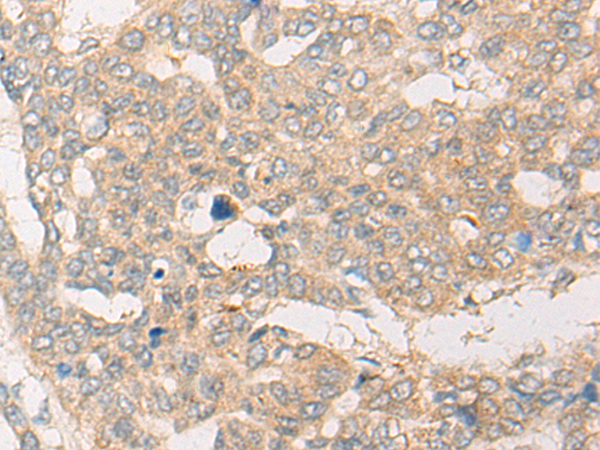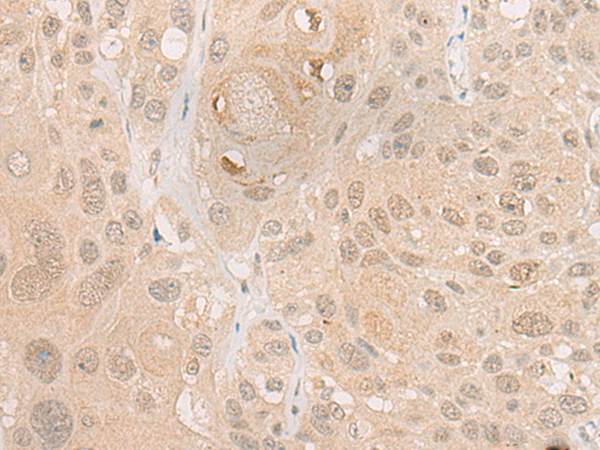

| WB | 咨询技术 | Human,Mouse,Rat |
| IF | 咨询技术 | Human,Mouse,Rat |
| IHC | 1/25-1/100 | Human,Mouse,Rat |
| ICC | 1/ 25-100 | Human,Mouse,Rat |
| FCM | 咨询技术 | Human,Mouse,Rat |
| Elisa | 咨询技术 | Human,Mouse,Rat |
| Aliases | CP7B; CBAS3; SPG5A |
| Entrez GeneID | 9420; |
| Host/Isotype | Rabbit IgG |
| Antibody Type | Primary antibody |
| Storage | Store at 4°C short term. Aliquot and store at -20°C long term. Avoid freeze/thaw cycles. |
| Species Reactivity | Human |
| Immunogen | Synthetic peptide of human CYP7B1 |
| Formulation | Purified antibody in PBS with 0.05% sodium azide. |
+ +
以下是关于CYP7B1抗体的参考文献示例(内容基于公开研究整理,具体作者及年份可能与实际文献略有差异,建议通过学术数据库进一步核实):
1. **文献名称**: "Characterization of CYP7B1-mediated oxysterol biosynthesis and its tissue distribution"
**作者**: Rose KA, et al.
**摘要**: 该研究通过制备特异性CYP7B1抗体,分析了其在人类和小鼠组织中的表达,发现其在肝脏、脑和免疫细胞中高表达,并证实其参与氧固醇代谢途径。
2. **文献名称**: "The role of CYP7B1 in bile acid synthesis and its regulation by nuclear receptors"
**作者**: Sundin T, et al.
**摘要**: 利用CYP7B1抗体进行Western blot和免疫组化,发现该酶在肝细胞中定位,并受FXR和LXR核受体调控,影响胆汁酸合成的替代途径。
3. **文献名称**: "CYP7B1 deficiency promotes neuroinflammation and cognitive dysfunction in Alzheimer’s disease models"
**作者**: Yoshioka H, et al.
**摘要**: 通过CYP7B1抗体检测基因敲除小鼠脑组织,发现其缺失导致神经固醇代谢异常,加剧β淀粉样蛋白沉积和神经炎症,提示与阿尔茨海默病相关。
4. **文献名称**: "Autoimmune regulator AIRE interacts with CYP7B1 to impact immune tolerance"
**作者**: Wu Z, et al.
**摘要**: 研究利用CYP7B1抗体揭示其在胸腺上皮细胞的表达,并发现与AIRE蛋白的相互作用异常可能导致自身免疫性疾病的发生。
建议通过PubMed或Google Scholar搜索上述关键词,结合具体实验需求筛选文献。
The CYP7B1 antibody is a research tool designed to detect and study the CYP7B1 enzyme, a member of the cytochrome P450 superfamily involved in lipid metabolism. CYP7B1 (cytochrome P450 family 7 subfamily B member 1) plays a critical role in the alternative pathway of bile acid synthesis by catalyzing the 7α-hydroxylation of oxysterols and steroid precursors. It is expressed in various tissues, including the liver, brain, and prostate, and is implicated in regulating cholesterol homeostasis, neurosteroid metabolism, and immune responses. Dysregulation of CYP7B1 has been linked to metabolic disorders, neurodegenerative diseases (e.g., hereditary spastic paraplegia type 5. SPG5), and certain cancers.
The antibody enables researchers to investigate CYP7B1's protein expression, localization, and function through techniques like Western blotting, immunohistochemistry, and immunofluorescence. It is particularly valuable for studying tissue-specific roles of CYP7B1. such as its neuroprotective effects in the brain or its involvement in hormone-dependent cancers. Additionally, the antibody aids in diagnosing genetic mutations affecting CYP7B1 activity, which can cause bile acid synthesis defects or neurological impairments. Developed using immunogenic peptide sequences, modern CYP7B1 antibodies prioritize high specificity and sensitivity to minimize cross-reactivity with related P450 enzymes. Their applications span basic research, clinical diagnostics, and therapeutic target validation.
×